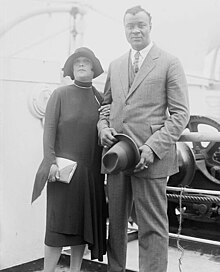Harry Wills
Wills fought for over 20 years (1911–1932), and was ranked as the number-one challenger for the world heavyweight championship, but was denied the opportunity to fight for the title.
Of all the black contenders between the heavyweight championship reigns of Jack Johnson and Joe Louis, Wills came closest to securing a title shot.
Wills also defeated colored heavyweight champ Sam McVey three times and fought two no-decision bouts with Joe Jeanette.
[8] A deadly race riot in the wake of Jack Johnson vs. James J. Jeffries also created reluctance to promote the match.
[9][10] The stand taken by Commissioner Farley would help enable Farley to add the African American vote to the New Deal coalition as Franklin D. Roosevelt 's campaign manager and subsequently Chairman of the Democratic National Committee from the Republican Party, which had traditionally up until the 1930s controlled the African American voting block as the party of Lincoln.
This history traces the advent and demise of the Championship, the stories of the talented professional athletes who won it, and the demarcation of the color line both in and out of the ring.
For decades the World Colored Heavyweight Championship was a useful tool to combat racial oppression-the existence of the title a leverage mechanism, or tool, used as a technique to counter a social element, “drawing the color line.” Harry Wills was inducted into the International Boxing Hall of Fame in 1992.

